Resuscitation and DNRs
What is a DNR? Does Jewish Law Ever Believe a DNR is Appropriate?
When a person’s heart stops beating (“cardiac arrest”), the heart cannot pump blood to the brain, lungs, and rest of the body.
Jewish Law emphasizes and almost always requires the preservation of life.
The Torah’s commandment, “You shall not stand idly over the blood of your neighbor,” mandates that we intervene and help, whether in a hospital or a home. This might include:
- Administering CPR (cardiopulmonary resuscitation). CPR uses chest compressions to mimic how the heart pumps and maintains blood flow. It can be performed by anyone using their hands alone.
- Using a defibrillator to shock the heart back to its regular rhythm.
- Providing IV (intravenous) fluids.
There are times, however, when CPR would be medically inappropriate. The cases include:
- Frailness: The body is too frail and weak to do such an aggressive procedure. CPR is an aggressive procedure that can sometimes break a person’s ribs. Normally it’s well worth the risk, but some bodies are too delicate for that type of intervention.
- Painful Terminal Illness: The patient is terminally ill, suffering, and no longer wants to endure living with such pain. In their condition, resuscitation might just prolong dying or cause a very painful death, instead of saving or extending life.
Jewish law does not obligate us to proactively begin to administer interventions that briefly extend a life of pain and suffering at the end of life. In these circumstances, a DNR (“Do Not Resuscitate”) order might be appropriate. A DNR means that if the patient’s heart stops beating, the medical staff will not initiate CPR or other interventions. Instead, we’ll allow death to occur naturally. In fact, some hospitals refer to this as an “AND order,” Allow Natural Death.
Many times, a DNR is not appropriate, and one should never feel coerced to agree to one. Patients and their families have the right to request continued intervention. However, there are circumstances in which it would be appropriate to passively allow nature to take its course. This occurs when three conditions are met:
- Expert medical opinion has determined that the patient is terminally ill. There is no chance of a cure and the patient is heading towards death in the coming months. Any medical intervention can only minimally prolong life.
- The patient is suffering – physically or emotionally – even though they are receiving medication to control the pain.
- The patient does not want to undergo resuscitation. They state (or previously have indicated to their proxy, orally or in a living will) that they’ve endured too much already and/or don’t want additional interventions that have limited benefit.
When all of these conditions have been met, the Torah permits a compassionate response of allowing the dying process to occur naturally with appropriate palliative care.
Before agreeing to a DNR, we recommend a group conversation with the patient (when possible), their proxy and close family members, the primary healthcare provider, and one’s rabbi. Ematai’s hotline is always available for consultation.
Even when a DNR order has been agreed upon, we must continue to provide attentive care, the basic necessities of life, and ensure that the patient does not suffer. DNR does not mean DNT, Do Not Treat. DNR does not mean DNC, Do Not Care. We always care for our patients and loved ones. But sometimes, aggressive efforts on their bodies are not in their best interest.
Where is a DNR recorded? Understanding a POLST form
A DNR directive is frequently recorded on a POLST* (Physician Orders for Life-Sustaining Treatment) form. A “POLST” is a form containing medical orders that a physician, nurse practitioner or physician assistant initiates and completes for a patient likely being in the final year of their life. Usually printed on bright pink paper, a POLST consists of general instructions regarding types of treatment you are to receive based on your healthcare provider’s best medical judgment as well as your goals and preferences. Unlike other medical orders, however, in addition to the healthcare provider signing these orders, you or your proxy are asked to sign the POLST as well, as further indication that these orders would be fitting for you as you approach the end of your life. A POLST thus touches upon the gravest of halakhic questions and intervention dilemmas.
Once completed, a POLST will guide decision-making for your care, whether you are in a hospital, rehabilitation center, nursing home, or your home. Given the serious implications of these documents, one should talk to your physician, proxy, and rabbi about whether a POLST makes sense for you.
*Different areas use slightly different acronyms to refer to the same set of provider orders, such as: MOLST (Medical Orders for Life-Sustaining Treatment), POST (Physician Orders for Scope of Treatment), MOST (Medical Orders for Scope of Treatment), or TROPP (Transportable Physician Orders for Patient Preferences).




